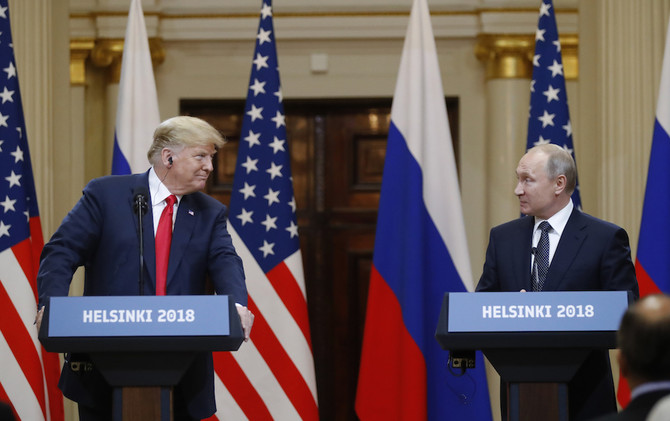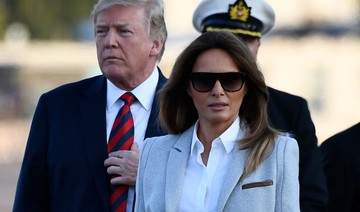HELSINKI: US President Donald Trump called on Russian President Vladimir Putin to help curb Iran’s regional expansionism, when the two leaders met on Monday at a historic summit in the Finnish capital, Helsinki. 
The two men also agreed to work together on ending the war in Syria, where they are on opposing sides.
Diplomatic analysts have speculated that Trump and Putin could reach a “grand bargain” in which the Russian leader would support efforts to limit Tehran’s regional meddling and curb its ballistic missile program, in return for US acceptance of Russia’s rights in Crimea.
At a news conference after Monday’s meeting in Helsinki, Trump said he had stressed the importance of putting pressure on Iran, an ally of Russia. Putin said he was aware of US opposition to the 2015 Iran nuclear deal, which until now Russia has supported.
On Syria, Putin said the conditions were in place for effective co-operation between the US and Russia, whose military intervention in 2015 saved the Assad regime from collapse. Trump said Washington and Moscow also wanted to help the Syrian people on a humanitarian basis.
“Our militaries have gotten along better than our political leaders for a number of years. And we get along in Syria too,” he said.
On the issue that has dominated US coverage of the summit, Trump said he saw no reason to believe his own intelligence agencies rather than trust the Kremlin leader on the question of whether Russsia interfered to help him win the 2016 election.
He made no criticism of Russia on any of the issues that have brought relations between the two powers to the lowest ebb since the Cold War.
Instead, he denounced the “stupidity” of his own country’s policy, especially the decision to investigate election interference.
Asked if he believed US intelligence agencies, which concluded that Russia interfered in the 2016 election to help him defeat Democratic candidate Hillary Clinton, he said he was not convinced.
“I don’t see any reason why it would be” Russia, Trump said. “President Putin was extremely strong and powerful in his denial today.”
Before the summit even began, Trump blamed his own country for the deterioration in relations.
“Our relationship with Russia has never been worse thanks to many years of US foolishness and stupidity and now, the Rigged Witch Hunt!” he said on Twitter.
The Russian Foreign Ministry tweeted back: “We agree.”
At the news conference, Trump was invited by reporters to offer any criticism of Russia but he repeatedly declined. Asked if Russia was at all to blame for the poor ties, he said: “I hold both countries responsible. I think the US has been foolish. We’ve all been foolish.
“I beat Hillary Clinton easily and frankly we beat her… We won that race and it’s a shame that there can be even a little bit of a cloud over it.”
Our relationship with Russia has NEVER been worse thanks to many years of U.S. foolishness and stupidity and now, the Rigged Witch Hunt!
— Donald J. Trump (@realDonaldTrump) July 16, 2018
Asked if Putin was an adversary, he said: “Actually I called him a competitor and a good competitor he is and I think the word competitor is a compliment.”
Putin spoke of the importance of the two countries working together and praised Trump, at one point interrupting the news conference to give the US president a soccer ball.
-----
Putin says the "so-called Russian interference" in the US 2016 presidential election was brought up by Trump during their summit.
Putin said: "I had to repeat that the Russian state never interfered, and does not plan to interfere in internal American electoral process."
In general, he said, the talks with Trump took place in an "open and businesslike atmosphere" and he characterized them as "successful and useful."
-----
The summit, which was being closely watched by rattled world capitals, was condemned in advance by members of Congress from both parties after the US indictment last week of 12 Russian military intelligence officers accused of hacking Democrats in the 2016 election to help Trump’s presidential campaign. Undeterred, the American president was set to go face to face with Putin, the authoritarian leader for whom he has expressed admiration.
Trump was greeted at the palace by Finland’s president. The summit was starting later than scheduled because Putin arrived in Helsinki about a half hour late in another display of the Russian’s leader famous lack of punctuality. Trump seemed to return the favor by waiting until Putin had arrived at the palace before leaving his hotel. Putin has been late for past meetings with the pope and British Queen, among many others.



























